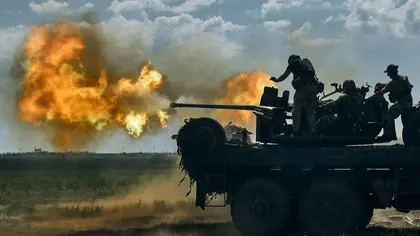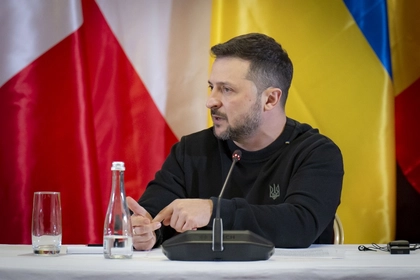With Ukrainian assaults in three parts of the front over the last four days, there are clear signs that Ukraine’s much-anticipated counteroffensive against Russian-occupied territories may have begun.
Following many weeks of “shaping activities” prior to a counteroffensive, offensive pushes by Ukrainian military forces have taken place around Bakhmut in the Donetsk region, southwest of Orikhiv in the western Zaporizhzhia region, and around Velyka Novosilka, near the border of Zaporizhzhia and Donetsk regions.
JOIN US ON TELEGRAM
Follow our coverage of the war on the @Kyivpost_official.
Since Sunday, June 4, Ukrainian units have been hitting Russian positions on the southern and northern flanks of Bakhmut and have made advances of up to 1,600 meters, according to both Ukraine’s Deputy Minister for Defense Hanna Malyar and Serhiy Cherevaty, the official spokespersons for Ukraine’s eastern military forces.
Since Sunday, June 4, Ukrainian units have conducted operations against Russian positions in occupied western Zaporizhzhia oblast, including 15 kilometers southwest of the city of Orikhiv, according to the Institute for the Study of War (ISW).
“Ukrainian forces conducted a limited, but still significant attack in the western Zaporizhzhia Region on the night of June 7 to 8,” ISW said in its daily campaign update. “Russian forces apparently defended against this attack in a doctrinally sound manner and had reportedly regained their initial positions as of June 8.”

N. Korean Troops Massed in Russia to Enter Ukraine War ’Soon’: Pentagon Chief
ISW said that Russian sources began reporting late at night on June 7 that elements of Ukrainian brigades that have recently been equipped with Western kit launched an attack southwest of Orikhiv in the western Zaporizhzhia region with the aim of breaking through the Russian defensive line between Robotyne and Verbove, both about 15 kilometers southeast of Orikhiv.
Geolocational footage, ISW said, showed that Ukrainian forces most likely broke through the first line of defense in this area, but that Russian elements succeeded in counterattacking and eventually pushing Ukrainian forces back to their original positions.
NEW: #Ukraine has conducted #counteroffensive operations with differential outcomes in at least three sectors of the front as part of wider counteroffensive efforts that have been unfolding since Sunday, June 4.
— Institute for the Study of War (@TheStudyofWar) June 9, 2023
Latest assessment w/ @criticalthreats: https://t.co/A1Y19HR1xc pic.twitter.com/K2jwvQmVsb
Kyiv Post on Thursday identified multiple Russian military information platforms reporting substantial Ukrainian ground attacks were in progress. Senior Ukrainian officials confirmed the fact of fighting, but denied Thursday's combat was the main offensive.
Later on Friday, Ukrainian Deputy Defence Minister, Ganna Malyar, said the main centre of fighting is still in Ukraine's east.
"The situation is tense in all areas of the front line. The east is the epicentre," she wrote on Telegram.
"The enemy continues to concentrate its main efforts on the Lyman, Bakhmut, Avdiivka and Maryinka directions", she added, referring to eastern cities where fighting has been raging for months.
The deputy minister gave few details on the situation in southern Ukraine.
In response to a request from Kyiv Post to confirm that recent military actions in eastern Ukraine were part of Kyiv’s counteroffensive, Ukraine’s defense minister Oleksiy Reznikov, said on Friday: “Yes, we launched our counteroffensive on February 24, 2022.”
In his daily address on Thursday evening, President Zelensky hinted at “a result” in ongoing fighting, saying: “I am in constant communication with our military. The commanders of Khortytsia, Tavria, all those involved in the hottest areas.
“Donetsk region - very tough battles. But there is a result, and I am grateful to everyone who ensures this result! Bakhmut - well done. Step by step.”
The moves around Zaporizhzhia, which is part of the Russian-occupied land bridge from mainland Russia to Crimea, were also today reported by Washington Post.
It wrote that “Ukrainian troops, including specialized attack units armed with Western weapons and trained in NATO tactics, intensified their strikes on front-line positions in the country’s southeast Wednesday night, according to [anonymous] four members of the country’s armed forces, beginning a significant push into Russian-occupied territory.”
Russian Defense Minister Sergei Shoigu said Ukrainian forces tried to break through the lines of the Russian army in the Zaporizhzhia region, using up to 1,500 troops and 150 armored vehicles.
Video released by the Russian Ministry of Defense on Thursday and independently verified by Washington Post showed a Ukrainian tank being destroyed in the Zaporizhzhia region.
An aerial photo of the same scene showed a column of at least six Ukrainian military vehicles, which appear to include German-made Leopard 2 tanks, according to two military analysts that Washington Post interviewed. The Leopard 2 tanks have not been seen in combat in Ukraine up until this week.
The Russian army on Friday said it had repelled several attacks on the southern Ukrainian front, where fighting sharply intensified this week amid expectations of a major Kyiv offensive.
"Over the past day, the armed forces of Ukraine continued attempts to conduct offensive operations in the South-Donetsk and Zaporizhzhia directions," the Russian army said.
It said they were "decisively" pushed back by Russian troops and planes.
The Russian army it had repelled four attacks "carried out by forces of up to two battalion tactical groups, reinforced with tanks" near the village of Levadnoye in the Zaporizhzhia region and in Novosleka village in the Donetsk region.
The other two attacks were near the Novodanilovka and Malaya Tokmachka in Zaporizhzhia.
Valeriy Shershen, a spokesperson for Ukrainian military units located across much of the eastern and southern front line, confirmed to Washington Post that there was “more activity” in the Zaporizhzhia region, but added that he “wouldn’t say it’s something major.” In the Zaporizhzhia region, Ukrainian forces are generally “still in a defense operation,” Shershen said.
Shershen also described to Washington Post “small counteroffensive activities” on a local scale, such as a fight for Velyka Novosilka, a village in the Donetsk region just east of Zaporizhzhia.
The direct moves involving mechanized infantry units follow many weeks of “shaping operations” by Ukrainian forces including air, missile, drone and special operations attacks against Russian logistics centers, oil refineries, command centers, and troop concentrations. It also comes after incursions by military forces into the Belgorod region in Russia.
You can also highlight the text and press Ctrl + Enter






